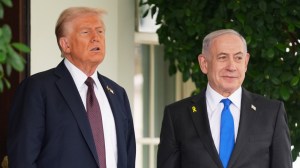Waiting for Holbrooke
Indias chance for a grand Indo-US bargain on Pakistan and Afghanistan
As the US Special Representative for Afghanistan and Pakistan,Richard Holbrooke,prepares for his first visit to South Asia,New Delhi should be ready to offer the Obama administration a grand bargain on regional security.
The purpose of New Delhis successful lobbying effort in Washington to remove India and Kashmir from Holbrookes South Asia mandate which has received some breathless commentary from Washingtons Beltway was not about avoiding an engagement with the Obama administration on the regional conflicts. The more astute among Washingtons analysts have figured out Indias real aim to generate the right atmosphere for a sustained and comprehensive Indo-US conversation on how to stabilise the lawless lands between the Indus and the Hindu Kush.
After the positive gesture from the Obama administration,it is New Delhis turn to reciprocate by offering to work out a framework for mutually beneficial regional security cooperation. If Washington is ready to press Islamabad to abandon for ever its instrumentalisation of terror and extremism,India will certainly be willing to help the United States in managing the profound threats to its national security from the borderlands of Pakistan and Afghanistan. Once New Delhi and Washington recognise their shared interests in stabilising and modernising Afghanistan and Pakistan,the template for give and take presents itself.
Any suggestion of an Indo-US deal on regional security would horrify the conventional wisdom in New Delhi and Washington. This is not surprising,since Pakistan has been at the very heart of the security divergence between India and the US for all these decades. We might,however,recall how wrong the conventional wisdom in both the capitals was on the nuclear question the other critical contention between India and the US. Having achieved the seemingly impossible goal of nuclear reconciliation with the US under the Bush administration,India must have a shot at working with the Obama administration in transforming Indias north-western frontiers.
If nothing else,the Holbrooke mission offers a valuable opportunity for India to test out the possibilities of a grand Indo-US bargain on Pakistan and Afghanistan.
Indias sensitivities in talking with the US or any other third party on its conflicts with Pakistan are well- known and have received much publicity during the recent disastrous visit of the British Foreign Secretary,David Miliband,to India. Less discussed in public are the deeply held reservations in Washington on talking Pakistan with India. Even the Bush administration that presided over the dramatic transformation of Indo-US relations was hesitant to embark on a serious joint effort against terrorism in the region after 9/11.
Although the security agencies of India and America have opened up to each other after the Mumbai attack,the structural impediments to Indo-US cooperation on counter-terrorism have not been removed. The American reluctance has been rooted in Washingtons deference to Pakistans sensitivities. This was the flip side of the Bush administrations policy of de-hyphenation. Although de-hyphenation worked well for New Delhi in the American nuclear differentiation between India and Pakistan,it remains the major obstacle in confronting the sources of extremism and terrorism across the border.
Before the Bush presidency,the US often sought to interpose itself in Indo-Pak disputes much to the anger of New Delhi. During the Bush years,both sides were happy to put the problem of Pakistan aside,and expand cooperation on other issues. Bush put India and Pakistan in separate boxes,and pursued good relations with both. New Delhi was relieved that Washington stopped preaching on Kashmir. New Delhi and Washington would engage with Islamabad in their own bilateral frameworks,except of course during crises.
The separate approaches that Washington and New Delhi have sought with Islamabad are no longer sustainable,given the deepening political instability in Pakistan and the resurgence of the Taliban and Al-Qaeda in its borderlands with Afghanistan. More than seven years after 9/11,the US has figured out that the Pakistan army is playing both sides of the so-called war on terror. This is the context in which Obama is demanding greater accountability from the Pakistan army. Obama has also recognised that the Bush administrations exclusive reliance on the Pakistan army must be complemented if not supplemented by a comprehensive regional approach.
On its part,India has begun to appreciate the limits of its traditional bilateralism in dealing with Pakistan. Whether it acknowledges or not,New Delhi is fully aware that the US was for all practical purposes the third party during Indias recent confrontations with Pakistan,in the 1999 Kargil war and the military confrontation that followed the attack on the Indian Parliament on December 13,2001. Given the seeming inability of Pakistans civilian leadership to do the right thing after the Mumbai outrage,it is certainly in Indias interest to mobilise the full weight of the international community,especially that of the US,in forcing a change in Pakistans behaviour.
It is quite clear that neither Washington nor New Delhi has the power to unilaterally dictate the positive evolution of Pakistan. Acting together,however,they might have a small chance of transforming the internal and external orientation of Pakistan. That in turn provides the basis for a grand bargain between New Delhi and Washington on regional security. It would involve Washington using all the instruments at its command to dismantle Pakistans terror infrastructure directed at both Afghanistan and India. New Delhi,in turn,should be prepared to help the US construct secure and legitimate borders for Pakistan on its eastern and western frontiers.
Having conducted a significant back channel negotiation with Pakistan on Kashmir during 2005-07,India should be ready to clinch it in return for an irreversible closure of Pakistans terror schools. Once Pakistans eastern frontiers are secured,India would be in a position to contribute significantly to the stabilisation of the Durand Line that the US so badly needs.
The writer is a professor at the S. Rajaratnam School of International Studies,Nanyang Technological University,Singapore
express@expressindia.com





- 01
- 02
- 03
- 04
- 05


























